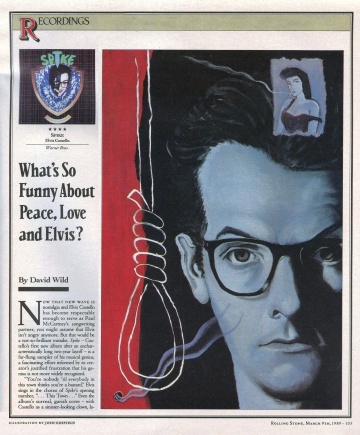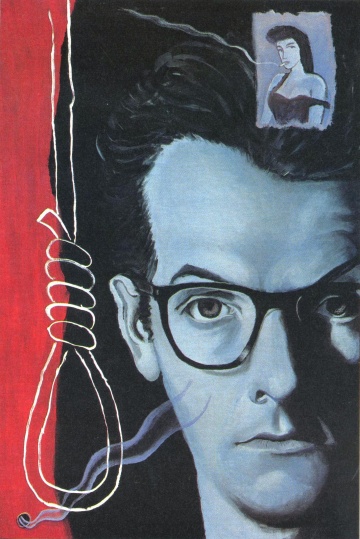Rolling Stone, March 9, 1989: Difference between revisions
(formatting) |
(formatting +US rock magazines index) |
||
| Line 2: | Line 2: | ||
{{:Bibliography index}} | {{:Bibliography index}} | ||
{{:Rolling Stone index}} | {{:Rolling Stone index}} | ||
{{: | {{:US rock magazines index}} | ||
{{Bibliography article header}} | {{Bibliography article header}} | ||
<center><h3> What's | <center><h3> What's so funny about peace, love and Elvis? </h3></center> | ||
<center>''' Elvis Costello ''' / Spike </center> | <center>''' Elvis Costello ''' / Spike </center> | ||
---- | ---- | ||
| Line 11: | Line 11: | ||
[[image:Star full.svg|11x11px]][[image:Star full.svg|11x11px]][[image:Star full.svg|11x11px]][[image:Star full.svg|11x11px]] | [[image:Star full.svg|11x11px]][[image:Star full.svg|11x11px]][[image:Star full.svg|11x11px]][[image:Star full.svg|11x11px]] | ||
{{Bibliography text}} | {{Bibliography text}} | ||
Now that new wave is nostalgia and Elvis Costello has become respectable enough to serve as | Now that new wave is nostalgia and Elvis Costello has become respectable enough to serve as Paul McCartney's songwriting partner, you might assume that Elvis isn't angry anymore. But that would be a not-so-brilliant mistake. ''Spike'' — Costello's first new album after an uncharacteristically long two-year layoff — is a far-flung sampler of his musical genius, a fascinating effort informed by its creator's justified frustration that his genius is not more widely recognized. | ||
"You're nobody 'til everybody in this town thinks you're a bastard," Elvis sings in the chorus of ''Spike'''s opening number, "[[...This Town...]]". Even the album's surreal, garish cover — with Costello as a sinister-looking clown, labeled as "The Beloved Entertainer" — seems to be Costello's defensive way of mocking the very concept of being a popular entertainer. In truth, Costello's problem is not so much that everybody thinks he's a bastard as that not everybody cares about him these days. In the years since his late-seventies commercial peak, a new generation has come of age that thinks "[[Less Than Zero]]" is just a book by Bret Easton Ellis. | "You're nobody 'til everybody in this town thinks you're a bastard," Elvis sings in the chorus of ''Spike'''s opening number, "[[...This Town...]]". Even the album's surreal, garish cover — with Costello as a sinister-looking clown, labeled as "The Beloved Entertainer" — seems to be Costello's defensive way of mocking the very concept of being a popular entertainer. In truth, Costello's problem is not so much that everybody thinks he's a bastard as that not everybody cares about him these days. In the years since his late-seventies commercial peak, a new generation has come of age that thinks "[[Less Than Zero]]" is just a book by Bret Easton Ellis. | ||
That's a real shame, because, as ''Spike'' makes clear, Costello remains an astonishing talent. While less cohesive than his two 1986 albums — the justly lauded '' | That's a real shame, because, as ''Spike'' makes clear, Costello remains an astonishing talent. While less cohesive than his two 1986 albums — the justly lauded ''King of America'' and the underappreciated ''Blood and Chocolate'' — ''Spike'' is more ambitious. | ||
As if to prove there's no genre he can't conquer, Costello has recorded ''Spike'' not with his trusty Attractions (though drummer [[Pete Thomas]] does appear on two tracks) but with a distinguished and eclectic group of musicians — [[the Dirty Dozen Brass Band]], [[T Bone Burnett]] (who produced the album with [[Kevin Killen]]), Paul McCartney (who also shares two writing credits with Costello), [[Chrissie Hynde]], [[Allen Toussaint]], [[Roger McGuinn]], [[Benmont Tench]], [[Mitchell Froom]], and [[Jim Keltner]], as well as two Tom Waits sidemen, [[Michael Blair]] and [[Marc Ribot]], and a crew of Irish players including [[Christy Moore]], [[Derek Bell]], and [[Dónal Lunny|Donal Lunny]]. | As if to prove there's no genre he can't conquer, Costello has recorded ''Spike'' not with his trusty Attractions (though drummer [[Pete Thomas]] does appear on two tracks) but with a distinguished and eclectic group of musicians — [[the Dirty Dozen Brass Band]], [[T Bone Burnett]] (who produced the album with [[Kevin Killen]]), Paul McCartney (who also shares two writing credits with Costello), [[Chrissie Hynde]], [[Allen Toussaint]], [[Roger McGuinn]], [[Benmont Tench]], [[Mitchell Froom]], and [[Jim Keltner]], as well as two Tom Waits sidemen, [[Michael Blair]] and [[Marc Ribot]], and a crew of Irish players including [[Christy Moore]], [[Derek Bell]], and [[Dónal Lunny|Donal Lunny]]. | ||
With that kind of diverse support, it's not surprising that the only constant in the album is Costello's incredibly high standard of songwriting. Though he has rarely run out of things to say in his lyrics, Costello has in recent years had trouble finding interesting ways to express himself musically: Blood and Chocolate, for example, seemed to beat a hasty retreat from the folkish grace of King of America to the classic early Attractions sound. | With that kind of diverse support, it's not surprising that the only constant in the album is Costello's incredibly high standard of songwriting. Though he has rarely run out of things to say in his lyrics, Costello has in recent years had trouble finding interesting ways to express himself musically: ''Blood and Chocolate'', for example, seemed to beat a hasty retreat from the folkish grace of ''King of America'' to the classic early Attractions sound. | ||
''Spike'' — a scattershot, genre-bending work — solves this problem, at least for the moment. In the fabulously malevolent "[[Let Him Dangle]]" | ''Spike'' — a scattershot, genre-bending work — solves this problem, at least for the moment. In the fabulously malevolent "[[Let Him Dangle]]," Costello tells a frightening tale of crime and punishment with a rhythmically complex arrangement that recalls the herky-jerky, grungy style of Tom Waits's recent work. The instrumental "[[Stalin Malone]]" is an infectious piece of funk jazz played with considerable animation by the Dirty Dozen Brass Band. "[[Veronica]]," a delicate pop-rocker co-written with McCartney, and the dramatic "[[Miss Macbeth]]" are reminiscent of the ornate, Beatles-inspired material on Costello's ''Imperial Bedroom''; "Miss Macbeth" features the additional sonic boost of fiddle, uillean pipes, and bouzoukis. "[[Chewing Gum]]" is a fine, complex bit of Brit funk, and "[[Deep Dark Truthful Mirror]]" is a soulful ethics lesson that suggests somebody has been spending a few hours listening to Van Morrison CDs. And on the exquisite, spare "[[Baby Plays Around]]", written by Costello and his wife, [[Cait O'Riordan]], he proves again that he's one hell of a torch singer. | ||
''Spike'' is at least as interesting for what Costello says as how he says it. "[[Tramp The Dirt Down|Tramp the Dirt Down]]" is a vicious swipe at Margaret Thatcher and her betrayal of England's less fortunate. ''"When England was the whore of the world,"'' Costello sings, ''"Margaret was her madam."'' In "[[Satellite]]", Costello and backup vocalist Chrissie Hynde capture the sleazy heartbreak of an illicit high-tech love affair, to a delicate melody that features a bit of the Odd Couple theme. And in the haunting "[[God's Comic]]" — a song that | ''Spike'' is at least as interesting for what Costello says as how he says it. "[[Tramp The Dirt Down|Tramp the Dirt Down]]" is a vicious swipe at Margaret Thatcher and her betrayal of England's less fortunate. ''"When England was the whore of the world,"'' Costello sings, ''"Margaret was her madam."'' In "[[Satellite]]", Costello and backup vocalist Chrissie Hynde capture the sleazy heartbreak of an illicit high-tech love affair, to a delicate melody that features a bit of the Odd Couple theme. And in the haunting "[[God's Comic]]" — a song that Kurt Weill and Bertolt Brecht would be proud to call their own — Costello assumes the role of the Big Guy's fool. In the song, the comic meets God, who's sipping soda while lying on his waterbed, listening to Requiem, by Andrew Lloyd Webber, composer of ''Jesus Christ Superstar''. ''"He said, before it had really begun,"'' Costello sings, "''I prefer the one about my son."'' | ||
Costello has said that ''Spike'' — named partly in tribute to the popular musical comedian Spike Jones — is his first comedy record. But the comedy that Costello seems most interested in is the human comedy. ''Spike'' is a serious piece of work by any standard, a troubling masterpiece by a man who knows full well that clowntime is over. | Costello has said that ''Spike'' — named partly in tribute to the popular musical comedian Spike Jones — is his first comedy record. But the comedy that Costello seems most interested in is the human comedy. ''Spike'' is a serious piece of work by any standard, a troubling masterpiece by a man who knows full well that clowntime is over. | ||
| Line 42: | Line 42: | ||
{{Bibliography images}} | {{Bibliography images}} | ||
[[image:1989-03-09 Rolling Stone page 103.jpg| | [[image:1989-03-09 Rolling Stone page 103.jpg|360px|border]] | ||
<br><small>Page scan.</small> | <br><small>Page scan.</small> | ||
[[image:1989-03-09 Rolling Stone illustration.jpg| | <small> Illustration by Josh Gosfield.</small><br> | ||
[[image:1989-03-09 Rolling Stone illustration.jpg|360px|border]] | |||
[[image:1989-03-09 Rolling Stone cover.jpg|x120px|border]] | [[image:1989-03-09 Rolling Stone cover.jpg|x120px|border]] | ||
Revision as of 23:55, 26 March 2018
|




